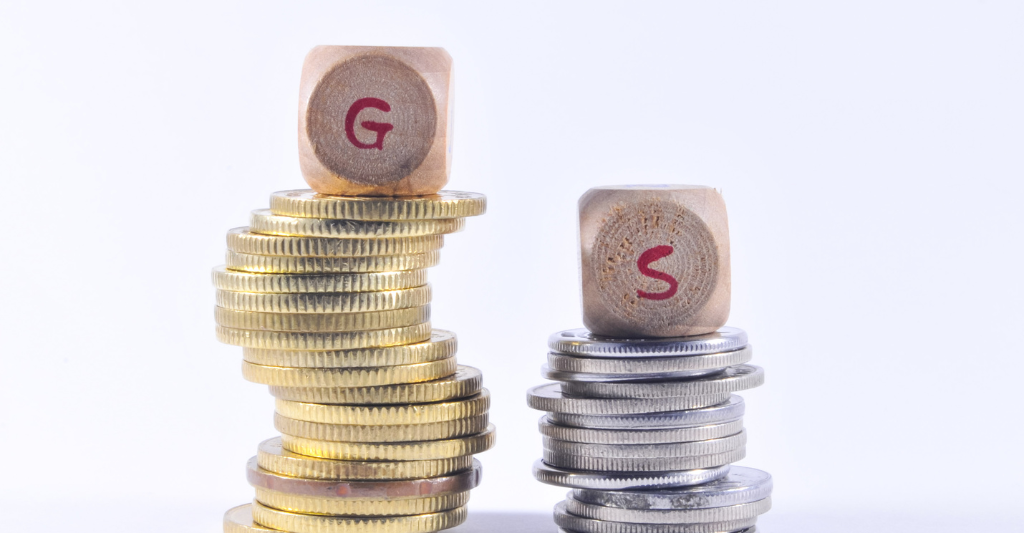For centuries, gold and silver have been considered valuable commodities, symbols of wealth, and even ornaments. Historically, both metals played significant roles in economic and cultural development. In modern times, gold and silver are playing crucial roles as potential investment options known to provide a hedge against economic uncertainties. But a question that bugs every investor is ‘Gold Vs silver – which is better?’ Well, if it bothers you too, then look no further! In this article, let’s compare gold and silver based on various factors and find out which is a better investment for you.
Table of Contents
Gold Vs silver investment: Which is better?
The below-mentioned six factors are important to consider while we are comparing the two precious metals.
Volatility
Historically, silver has proven to be more volatile than gold, primarily due to the extensive demand mostly from industries. It means demand for silver fluctuates with the economic cycle changes and the company’s operations. So in the dynamics of demand and supply, minute discrepancies can impact silver prices heavily. Further, the price of silver is closely related to gold. Changes in gold’s price can significantly influence the cost of silver.
Moreover, the silver market is smaller than gold and some other top companies. Disney’s market cap is 15 times bigger than silver, and Apple’s is 56 times larger. Given this, a relatively small change can impact silver prices more than gold or any other asset class.
Therefore, gold is considered a stable investment option in the comparison between gold and silver.
Liquidity
Liquidity is the ease of trading an asset without drastically impacting the market. When comparing the liquidity of gold and silver, gold clearly has an advantage over silver, primarily due to its popularity, demand, and higher trading volumes. The gold market is bigger than silver, making it easier for investors to transact in gold. In contrast, silver’s liquidity may fluctuate and require more caution in timing large trades.
Storage
For the same amount of investment, silver takes up considerably more space than gold. Further, the density of silver and its tendency to tarnish require specialised storage solutions. As a result, it can lead to a higher storage cost, making it less lucrative for investors and businesses.
Demand
When it comes to industrial use, ~12% of gold supply goes there, while due to silver’s unique characteristics, a whopping ~56% of its supply is used in industry. From electronics and medical equipment, to solar panels, silver is everywhere. Due to this, the demand for industrial uses of silver is high in a strong economy and weaker in a recession or deflation.
While silver’s demand is supported by industrial use, gold’s appeal lies in its status as a safe-haven asset and cultural significance.
Affordability
When comparing gold vs silver, it is a well-known fact that silver is more affordable than gold. You can purchase over 1 kg of silver with only half an ounce of gold. The gold-to-silver ratio currently stands at 120:1, the highest in the last 5,000 yrs.
Silver provides a cost-effective way to own precious metals for investors with a small budget, whereas gold is better suited for larger purchases.
Government reserves
Historically, the government held large inventories of silver as it was used to make coins. However, due to the decline in the particular use of silver, a decline in the government’s silver holdings can be seen. At the same time, the central government and banks hold substantial gold reserves, contributing to the ongoing demand for gold.
In case the government starts to buy silver for any reason, it would impact the market hugely – the demand may spike, and the price may skyrocket.
Difference between gold and silver: In brief
| Factor | Gold | Silver |
| Volatility | Relatively more stable investment option. | More volatile than gold. |
| Liquidity | Higher liquidity, larger market size, easier to trade. | Liquidity may fluctuate more in comparison to gold. |
| Storage | Takes up less space and lower storage costs. | Takes up considerably more space and requires specialised storage. |
| Demand | Appeals as a safe-haven asset and cultural significance. | Demand fluctuates with economic conditions. |
| Affordability | Expensive and suited for larger purchases. | affordable; cost-effective for small-budget investors. |
| Stockpile | Central banks hold substantial gold reserves. | The government’s silver holdings declined due to reduced usage in coinage. It would be impactful if governments started buying silver. |
Which one is better for you?
In terms of better returns, gold has a well-known record of generating steady returns. However, silver is not behind in the race. It generated 80-85% returns in 2010, whereas gold gave ~25%. Now, in the present market dynamics, gold provides more investment options such as gold ETFs, digital gold, Sovereign Gold Bonds (SGBs), gold mutual funds, and more. You will find such opportunities in silver as well.
If both metals have an edge in the market, how do you decide which is best for you? Well, there are various factors that you must consider while choosing between gold and silver. The factors include your financial situation, investment goals, risk appetite, and personal choice. Understand the merits and limitations of investing in both metals and if required, hire a financial advisor to help you plan a portfolio that may generate returns beyond expectations.
FAQs
Is silver safer than gold?
Gold has a better track record over long periods of time, and silver is considered a good portfolio diversifier. But to comprehend which metal is safer, you must analyse both the metals and their market thoroughly, along with your risk tolerance. If required, consult a financial advisor before finalising any investment and ensuring the right decision is made.
Which has high risk: Gold or silver?
When it comes to risk, silver is more volatile than gold. Many factors affect the prices of silver, such as changes in economic conditions, gold prices, etc. Furthermore, silver has a smaller market than gold, resulting in higher fluctuations in prices with a small change. Hence, gold is considered more stable than silver due to all these factors.
Why gold is preferred for making jewellery?
A simple reason why gold is preferred for making jewellery is that gold is one of the least reactive metals. It generally does not react with oxygen, water, or acids. Neither it loses its lustre. Further, gold is very ductile and malleable. Therefore, it is used for making jewellery.




